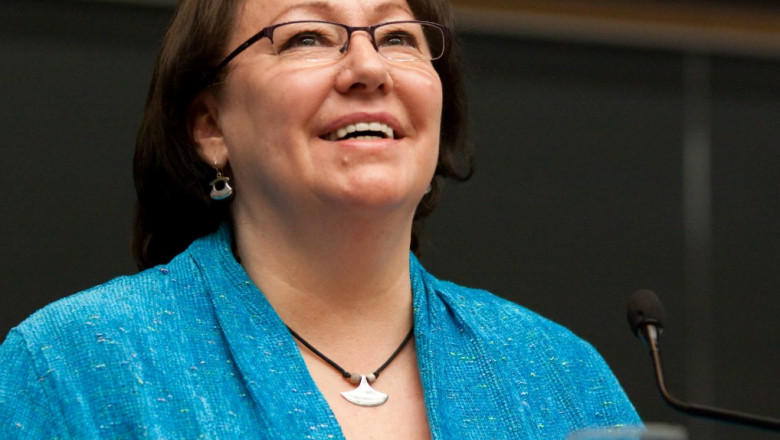
Sheila Watt-Cloutier in 2009. (TheSilentPhotographer/CC BY 3.0)
In her book "The Right to be Cold," Canadian Inuit activist Sheila Watt-Cloutier explores the connection between Inuit sovereignty and climate change through an explanation of the yearslong process of submitting a human-rights petition with the Inuit Circumpolar Council (ICC) to the Inter-American Commission on Human Rights. She was a political representative at local and national levels within the Inuit Nation for 10 years, and in 2002 she represented her tribe on the world stage as International Chair of the Inuit Circumpolar Council (ICC). Watt-Cloutier was also nominated for a Nobel Peace Prize in 2007 for her sustained advocacy linking climate change with the deterioration of human rights, particularly for Indigenous communities.
Watt-Cloutier's advocacy emphasizes the continuous struggle between the Global North and the Global Majority, also referred to as industrialized societies and non-White, agrarian and/or nomadic societies, respectively. In her book, Watt-Cloutier describes Inuit traditions and rituals that some in the West may argue are counterintuitive to environmental protections. An outsider perspective may think that killing a seal sounds barbaric, yet Watt-Cloutier asserts that the Inuit depend on its meat, liver and brain for sustenance, sealskin to survive economically. In contrast to the morbid way that the image of blood on ice might be seen by many in the Global North, the Inuit recognize it as a sign of life and stability as the seal represents various forms of sustenance
An important aspect of environmental justice is protecting the lands and resources of all humans, while also respecting the health of the natural environment and other living beings. This acknowledgment of a multicultural, globalized society of the twenty-first century is missing from American environmental policy in general. Within the U.S. context, the National Environmental Policy Act (NEPA) mandates that federal agencies construct environmental impact statements (EISs) before taking certain actions, yet those statements may not include the rights and rituals of Indigenous people that live in areas affected by aforementioned actions. The construction of the Dakota Access Pipeline on the Standing Rock Indian Reservation is one of countless examples.
The Green New Deal is another example of federal inaction on climate justice. Rep. Alexandria Ocasio-Cortez (D-NY) and Sen. Ed Markey (D-MA) introduced the Green New Deal in 2019, but it did not acknowledge Indigenous environmental stewardship until its revised form in 2021, even though 80% of global biodiversity hotspots are protected by Indigenous groups. As it stands, the Green New Deal has five general targets:
- Achieve net-zero greenhouse gas emissions.
- Create millions of high wage jobs and ensure prosperity and economic security.
- Invest in the American infrastructure and industry to meet the needs of the 21st century.
- Ensure clean air and water, healthy food, access to nature, and a sustainable environment for all.
- Create just and equitable social and economic systems that care for our frontline and vulnerable communities.
This list of targets seeks to address a broader existing struggle within the environmentalist movement that Watt-Cloutier voices in her book, “The world is generally more aware of the Arctic’s wildlife than its people.” While wildlife protection and carbon reduction strategies are necessary to address anthropogenic climate change, they tend to neglect unjust circumstances imposed on Indigenous and historically oppressed groups. This version of The Green New Deal hopes to acknowledge this tension in the fifth target.
That being said, NGOs such as Greenpeace have a history of protecting wildlife at the cost of Indigenous peoples' traditions and well-being. This highlights a legacy of cultural absence within campaigns that are supposedly oriented around people and the planet. Watt-Cloutier concurs in "The Right to be Cold": "Greenpeace and other animal rights’ groups campaigns to stop the seal and whale hunts have devastated the livelihoods of Arctic Indigenous peoples, and had ignored our culture’s respect for these animals."
Historically, conservation work in the United States results in similar situations where Indigenous communities that live sustainably off the land are then forced to move somewhere else because of the lands’ legal status under conservation guidelines.
In enacting environmental policy as well as organizing environmental justice efforts, one must do what Watt-Cloutier did and appeal to what feminist political theorist Carol Hanisch refers to during the Women's Liberation Movement in 1970, "The personal is political."
In other words, environmental policy and environmental justice not only provide economic and political tools (i.e. a carbon tax or sustainable urban planning) but social and cultural approaches to age-old issues that our government and society fail to act upon. Issues of food sovereignty, equal access to reasonable education, wealth inequality, and fair representation in government can collectively address racism, sexism, xenophobia, classism, and other forms of division because they provide equitable political capital for historically oppressed groups and coalitions.
Moreover, it is crucial for lawmakers and activists alike to reach out and amplify the voices of historically excluded and oppressed communities and individuals because the systemic change necessary for fixing environmental issues encompasses all of us, not just one group. The world needs more public officials like Sheila Watt-Cloutier, and I strongly recommend that everyone read her book, "The Right to Be Cold."
